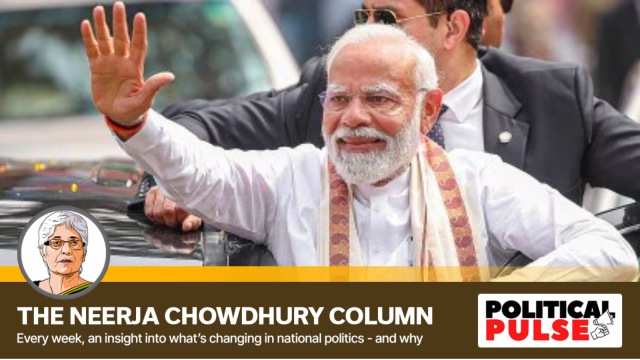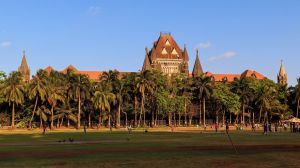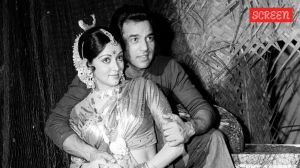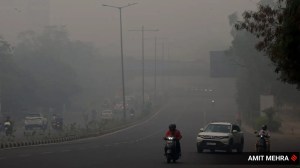PM Modi signals key moves in long game — overseas and at home
The Lex Fridman podcast showed that Narendra Modi might be looking to reflect on and push through the big issues that will shape his political legacy.
 Some of the challenges the PM faces today on the global stage and nationally — and the podcast pointed to them — come from the Right, quite ironic since he has represented a rightward shift in Indian politics. (File photo)
Some of the challenges the PM faces today on the global stage and nationally — and the podcast pointed to them — come from the Right, quite ironic since he has represented a rightward shift in Indian politics. (File photo)Prime Minister Narendra Modi’s extensive conversation with podcaster Lex Fridman, released last Sunday, caught eyeballs not just because the MIT researcher was an unusual choice for an interviewer — the PM does not do anything without careful deliberation — it was also unprecedented as it lasted for more than three hours.
Some of the challenges the PM faces today on the global stage and nationally — and the podcast pointed to them — come from the Right, quite ironic since he has represented a rightward shift in Indian politics. Like other heads of government, Modi too has to contend with the rise of US President Donald Trump and the tariff hikes that may threaten the old economic order in India and generate farmers’ unrest, among other worrying concerns.
Through the podcast, Modi chose to send messages that could not be conveyed via the usual diplomatic channels. The PM reached out to the Trump administration and rightwing public opinion, lavishly praising Trump, obviously hoping it would mollify him. He recalled the “Howdy Modi” event in Texas in 2019 to illustrate Trump’s magnanimity in sitting in the stadium while he was up on the dais speaking; and praised the US President’s courage to take risks, dispensing with security and going around the stadium, trusting Modi’s word that they do so. In other words, the PM’s message was clear: Trump could continue to trust his old friend Modi as both wanted to make their nations great.
Though it may be naive to expect that positive words will soften the hard blows of the tariffs, come April, sometimes personal chemistry between leaders can smoothen the way when the going gets rough. For instance, a rare rapport between Dr Manmohan Singh and George W Bush eased the way for the Indo-US civil nuclear deal in 2008. There was a bonhomie between Modi and Trump in the latter’s first term in office. But, from all accounts, Trump was not pleased when Modi did not meet him during the US presidential election campaign during his visit to America last year.
India has to navigate a difficult terrain with the US today. The PM has chosen to adopt a “positive” approach and India has gone out of its way not to react to provocations. It was not Trump who came out to the portico of the White House to receive Modi when he arrived in Washington DC last month (Trump received leaders such as British PM Keir Starmer and Ukrainian President Volodymyr Zelenskyy at the portico, though with the latter he had a stormy meeting).
Two hours before he met Modi, Trump went public about his intention to impose reciprocal tariffs against India. Handcuffed Indian immigrants were deported to India in US military planes and it agitated the public opinion here. But the government refrained from saying anything publicly.
Even as he praised Trump in the podcast, it was significant that the PM was not critical of Beijing. Reaching out to China, he emphasised the old civilisations they belonged to, saying that both countries were working to restore their relationship and ensure it went back to the pre-2020 state. It suits both countries to make these noises, given the global uncertainty that prevails today, even as their more basic differences need to be resolved.
On its part, China “appreciated” Modi’s “positive” words and Trump too posted Modi’s laudatory words about him on his website. What it adds up to in substantive terms remains to be seen: can India have a greater economic relationship with the US without putting all its eggs in one basket?
When Modi told Fridman that when he shakes hands with world leaders it is backed by 1.4 billion Indians, it was a reminder that India is a vast market the world can ill afford to ignore. This awareness of India’s importance in the global order has undergirded its diplomatic exchanges with the major powers.
Modi and RSS
On the domestic front, Modi’s effusive praise for the RSS was a sign of his willingness to make amends with the Sangh brass. It comes at a time when Uttar Pradesh CM Yogi Adityanath has burnished his Hindutva credentials following the Maha Kumbh in Prayagraj, combining religion with administration and initiating what is being described as “Dharmanomics” (the RSS sees Adityanath playing a national role in the future). While the PM has praised the people of UP for the organisation of the Maha Kumbh, he did not mention Adityanath by name.
Tensions marked the BJP’s relationship with the Sangh after J P Nadda last year told The Indian Express that the party no longer required hand-holding by the RSS. Since then, the RSS has discussed its relationship with the BJP at various of its important meetings. After holding back in the 2024 Lok Sabha elections, which saw the BJP tally come down to 240 seats, the RSS put its best foot forward in the state elections — Haryana, Maharashtra, and Delhi — that the BJP won handsomely, proving its value to the party.
With Modi now slated to visit the RSS headquarters in Nagpur on March 30 — he will be the first PM to visit Dr Hedgewar Bhavan — it is a sign that the Sangh brass will be that much more on the party’s decision-making table, particularly on organisational matters, and this includes the decision on who will succeed Nadda as BJP president. Modi’s style of functioning has been a cause of concern for some in the Sangh, but now a rebalancing of the BJP’s relationship with the RSS seems to be on the cards. Faced with new challenges globally and nationally, Modi, measured and flexible, appears to be stooping to conquer again.
The podcast also showed that Modi might be shifting gears, looking to reflect on the big issues that will shape his political legacy. It was not a hard-hitting Modi who sat before Fridman, demolishing opponents, or an aggressive Hindutva advocate, but a softer one keen on showing his spiritual side. He chose to speak about fasting and spending time with “saints and spiritual masters”, and pitched for world peace as a global “peacemaker”. In other words, the PM was trying to come across as an elder statesman, leaving the nitty-gritty of governance, such as the language row, to Amit Shah.
(Neerja Chowdhury, Contributing Editor, The Indian Express, has covered the last 11 Lok Sabha elections. She is the author of How Prime Ministers Decide)
- 01
- 02
- 03
- 04
- 05































